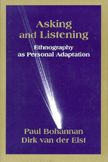“This is a book my students can use forever!” —Violet Sparks, Brookhaven College
“Asking and Listening is guided by superb questions and wise answers. It rests on the authors’ sound knowledge of the discipline and is enriched by their years of experience with the field and colleagues now deceased.” —Karla Poewe, University of Calgary
“Not only does the book make the ethnographic enterprise accessible to introductory students, it makes a powerful contribution to the philosophy behind the conduct of ethnography. It has insights that would not be possible without the authors’ long familiarity with the field. No one else could have written this book.” — Mari Womack, University of California, Los Angeles
“This is a fantastic little book. Rich and full despite its length. Engaging.” — Jim Warner, University of Northern Colorado
“A wise book—honest and probing—that is easy to read but covers hard and big issues . . . unique in its goal of making ethnography a way for the reader to live his or her life.”— John Omohundro, SUNY Potsdam
“A very readable book that touches on a number of important theoretical and methodological issues.” — Gary Ferraro, University of North Carolina, Charlotte
“Excellent little book. It is something I have been looking for. It is especially useful for people coming from monocultural backgrounds.” —Sinikka Dixon, Canadian University College

107 pages, $20.95 list
0-88133-987-3
978-0-88133-987-1
© 1998
paperback
eBook availability
Asking and Listening
Ethnography as Personal Adaptation
Giving students the capacity to include ethnography in their own experience! Asking and Listening is the first book to trace the changing ways in which human beings have learned to look at “the Others Beyond the Gate” with their strange languages and stranger customs. Not a history of ethnography so much as a chronicle of its uses and potentials, Asking and Listening examines the premises of ethnography and concerns itself with a wide range of issues such as ethnocentrism and the morass of cultural relativism, the cultures of corporations, and the meaning of ethnography for government policy. It ends with an examination of the problems in charting our tomorrows: ethnography in the information age, and for the future.
Through its pragmatic analysis of cultures as storehouses of alternatives in the way universal problems can and have been approached, Asking and Listening offers students not merely the opportunity to make sense of descriptions of other peoples’ lifeways, but makes such ethnographic knowledge immediately useful in their own lives, choices, and career plans.
Through its pragmatic analysis of cultures as storehouses of alternatives in the way universal problems can and have been approached, Asking and Listening offers students not merely the opportunity to make sense of descriptions of other peoples’ lifeways, but makes such ethnographic knowledge immediately useful in their own lives, choices, and career plans.
Reactions
Part I. ALIEN BEINGS WITH HUMAN FACES
1. The Others
2. Becoming You
3. Ethnography before Anthropology
4. The Discovery of Culture and the Discovery of Comparison
Part II. IMPROVING THE OBSERVERS
5. The Beginnings of Ethnographic Fieldwork
6. Participant Observation
7. Using Alien Ideas to Examine Our Own
8. Comparing Cultures
9. The Morass of Cultural Relativism
10. Premises and Ethnography
11. Their Culture—and Yours
12. Does Ethnography Falsify Reality?
13. Beyond Academe
14. Culture Shock
15. The Aliens Next Door
16. The Collapse of Colonialism
17. Who Speaks for Whom?
Part III. ETHNOGRAPHY AS A SURVIVAL MECHANISM
18. The Democratization of Ethnography
19. Ethnography and Applied Anthropology
20. Ethnography in Business and Industry
21. Ethnography and Creativity: Art, Science, and Engineering
22. Ethnography and Government
23. The Internet: Non-Lineal Ethnography
Part IV. THE CURSE OF ETHNOCENTRISM
24. Ethnocentrism in a Culture with Many Lifestyles
25. Ethnocentrism in a Shrinking World
26. Tempocentrism and the Future
1. The Others
2. Becoming You
3. Ethnography before Anthropology
4. The Discovery of Culture and the Discovery of Comparison
Part II. IMPROVING THE OBSERVERS
5. The Beginnings of Ethnographic Fieldwork
6. Participant Observation
7. Using Alien Ideas to Examine Our Own
8. Comparing Cultures
9. The Morass of Cultural Relativism
10. Premises and Ethnography
11. Their Culture—and Yours
12. Does Ethnography Falsify Reality?
13. Beyond Academe
14. Culture Shock
15. The Aliens Next Door
16. The Collapse of Colonialism
17. Who Speaks for Whom?
Part III. ETHNOGRAPHY AS A SURVIVAL MECHANISM
18. The Democratization of Ethnography
19. Ethnography and Applied Anthropology
20. Ethnography in Business and Industry
21. Ethnography and Creativity: Art, Science, and Engineering
22. Ethnography and Government
23. The Internet: Non-Lineal Ethnography
Part IV. THE CURSE OF ETHNOCENTRISM
24. Ethnocentrism in a Culture with Many Lifestyles
25. Ethnocentrism in a Shrinking World
26. Tempocentrism and the Future